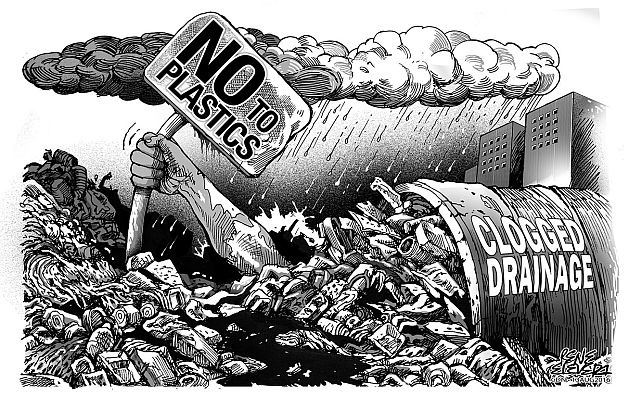
There were reports of two fast-food outlets that were objecting to Mandaue City’s plastics ban ordinance that went into force last month following the flash floods that stranded commuters for hours on end.
In a radio interview, Mandaue City Mayor Luigi Quisumbing explained that the enforcement of the 2010 ordinance is not just about doing one’s part to clean up the environment but more of a “public safety issue.”
He recounted a visit to one of the commercial establishments located beside a nearby river and saw the tons of trash comprised mostly of plastics that clogged the waterways and the canals, resulting in floods that reach knee-deep and waist-high in some areas.
Mandaue City has earned the unenviable reputation of being one of the most flooded areas in Metro Cebu and thus the mayor’s decision of an honest-to-goodness enforcement of a total plastic ban ordinance doesn’t just take admirable courage and sustained political will to see it through.
Cebu City Hall can take a page or two from the initial efforts by the Mandaue City government to enforce a total plastics ban considering its gargantuan garbage problem.
As discussed yesterday, the Inayawan landfill has only two years before reaching its maximum capacity to accommodate garbage discharged by the city’s households and companies. It would do well for the city to enforce their own plastics ban ordinance to augment their waste segregation program.
In fact, the plastics ban ordinance authored by former councilor and noted environmental advocate Nestor Archival was a lot more forgiving as it only imposed a plastics ban on Wednesdays and Saturdays (we think).
What we do understand is that both Mandaue City Hall and the Cebu City government are considering to privatize the garbage collection in much the same way that Cebu City privatized towing services for illegally parked vehicles.
In Cebu City’s case that would augment its garbage collection services which had been sorely lacking in the past few months. But to go back, Cebu City certainly needs to work overtime in enforcing the plastics ban even if it would mean some inconvenience on the part of households and commercial establishments.
That means barangay officials and tanods working overtime, maybe even holding barangay hall meetings on a weekly or monthly basis to monitor both the waste segregation and plastics ban programs.
Political will is often cited as the crucial ingredient in mobilizing public support for a project or program that will eventually benefit the whole community. That political will starts in the grassroots level where households are constantly reminded and required to comply with waste segregation practices.
This we have to do in order to significantly reduce the garbage we churn out on a daily basis. Less garbage means cleaner surroundings and a chance for all of us to breathe a little easier.